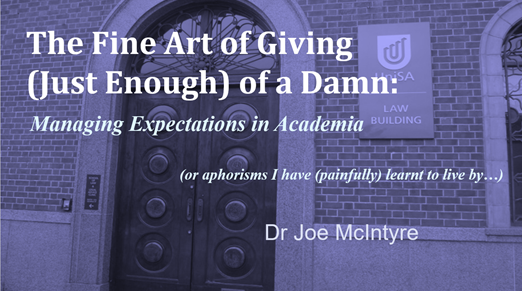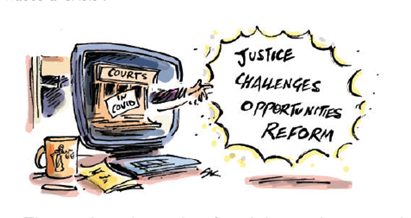If we loose the entire conference season - as looks likely - we are going to have to find alternatives. Perhaps @AcademicsLaw and @legalscholars could explore virtual conferences/workshops this year - with the advantage of inherent international collaboration
https://twitter.com/DrKatyBarnett/status/1238195391155195905
Given the theme of the @AcademicsLaw conference is the future of the legal academy, this seems particularly appropriate
I would love to have an e-workshop on twitter and the law - I know there was a US conference on this theme a few years back -i think @lawprofblawg was involved
We could get @ProfMarkElliott to discuss blogging and the @UKSupremeCourt. @jamessflee can talk about his course. @DarrenODonovan can talk on the role of social media in #robodebt. @JCharRoL can talk on court education. @jeremy_gans on using Twitter to drive discussion on crim
@paulmcgorrery "the sentencing boffin" on DV. @djag2 on social media and ICC reform. Get @ejiltalk involved on creating virtual communities in PIL, likewise @ukcla on #miller2. @steve_mcdee on twitter & bar. @DrKatyBarnett on the women in private law network.
@dr_lbc @DrNinaBoughey on public law discourse, and the role of @auspublawblog. Some big consti hitters like @ProfGWilliams and @CherylSaunders1 on the role of academics in affecting public law discourse in real time - s44, #sportsrorts etc
Maybe some anonymous accounts @ConstitLawAus @HighCourtTrivia @CriminalLawAus
Hell, let's get @BarristerSecret involved.
Hell, let's get @BarristerSecret involved.
There are some excellent emerging scholars who have been really effective in using Twitter to lift their profile and build networks - @_LisaParker @LiamElphick_ @juliettemm @katejmclachlan are just a couple that jump to mind
There are so many fabulous practitioners in #auslaw using #lawtwitter - @mrolandhill @auslawnerd @dougmcdnor @fchralph @felicitygerry @ReynoldsJDaniel @MrNJBaum @SarahEHoll @jono_miller @ChrisKaias @TarunaMcH @Bedeapk
Basically, everyone in this list:
Basically, everyone in this list:
https://twitter.com/paulmcgorrery/status/1235013075209613312
You could have a session on #lawtwitter and the media - there are some really engaged legal journalists out there: @KieranPender @SeanFewster @katiepwalsh @TammyMills1 @NicBerko @KateAllman_ to name but a few
@Pete_Burdon could talk on digital activism; @EddieSynot and @mdavisqlder on the role of digital engagement with #ulurustatement; @DrMCastan on using social media to create communities with @AcademicsLaw; @ColinGavaghan on tech and the law
A view from Uni Admi would be great too - perhaps @Marnie_HW or @lesleyhitchens could dial in and express their view; @BJRichards8 could discuss how LADRN and CALD can better engage here
And this is not even scratching the surface of US and UK contributors - in many ways #lawtwitter is even more engaged there
There are sooooo many fabulous twitterati out there in the legal academy, I can't possibly list them all. Thanks to every one who makes #lawtwitter fabulous. It is great to engage with you, and would be wonderful to meet you in a virtual conference at least (if not in person)
You could have panels with a few speakers on Zoom. Others can dial in and watch, then questions from the audience. Make sure you schedule time for social discussions - "tea breaks" in virtual break out rooms. Key note talks
All virtual. People from across the globe. Grand
All virtual. People from across the globe. Grand
I have just noticed my terrible spelling in this. Though the image of a whole academic year flapping loose in the winds of pandemic is kinda appropriate
• • •
Missing some Tweet in this thread? You can try to
force a refresh










